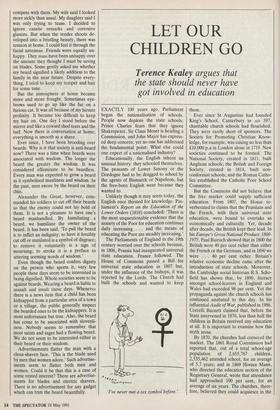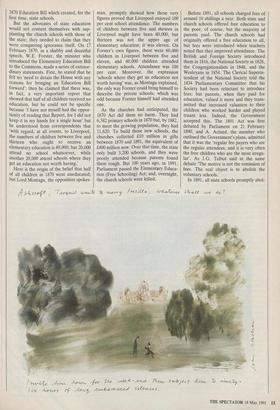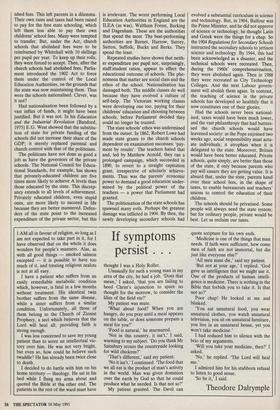LET OUR CHILDREN GO
Terence Kealey argues that
the state should never have got involved in education
EXACTLY 100 years ago, Parliament began the nationalisation of schools. People now deplore the state schools; Prince Charles fears that they ignore Shakespeare, Sir Claus Moser is heading a Commission, and John Major has express- ed deep concern; yet no one has addressed the fundamental point: What else could one expect of a nationalised industry?
Educationally, the English inherit an unusual history: they schooled themselves. The peasants of Lower Saxony or the Dordogne had to be dragged to school by the agents of Bismarck or Napoleon, but the free-born English went because they wanted to.
Unlikely though it may seem today, the English once thirsted for knowledge. Par- liament's Report on the Education of the Lower Orders (1818) concluded: 'There is the most unquestionable evidence that the anxiety of the Poor for education continues daily increasing . . . and the means of educating the Poor are steadily increasing.'
The Parliaments of England in the 19th century worried over the schools because, in 1806, Prussia had inaugurated universal state education. France followed. The House of Commons passed a Bill for universal state education in 1807 but, under the influence of the bishops, it was rejected by the Lords. The Church had built the schools and wanted to keep `I've never met a sex symbol before.' them.
Ever since St Augustine had founded King's School, Canterbury in AD 597, charitable church schools had flourished. They were rarely short of sponsors. The Society for Promoting Christian Know- ledge, for example, was raising no less than £10,000 p.a in London alone in 1719. New societies continued to be formed. The National Society, created in 1811, built Anglican schools; the British and Foreign Society, created in 1814, built non- conformist schools; and the Roman Catho- lics established the Catholic Poor School Committee.
But the Commons did not believe that the free market could supply sufficient education. From 1807, the House re- verberated to claims that the Prussians and the French, with their universal state education, were bound to overtake us economically and culturally. Yet, decade after decade, the British kept their lead. In his Europe's Gross National Product: 1800- 1975 , Paul Bairoch showed that in 1800 the British were 40 per cent richer than either the French or the Germans, and in 1890 we were . . . 40 per cent richer. Britain's relative economic decline came after the introduction of state schools. Moreover, the Cambridge social historian R.S. Scho- field has shown that, by 1890, literacy amongst school-leavers in England and Wales had exceeded 98 per cent. Yet the propaganda against the church schools has continued unabated to this day. In his influential Audit of War, published in 1986, Correlli Barnett claimed that, before the State intervened in 1870, less than half the children in Britain received any education at all. It is important to examine how this myth arose.
By 1870, the churches had cornered the market. The 1861 Royal Commission had reported that, out of a total school-age population of 2,655,767 children, 2,535,462 attended school, for an average of 5.7 years; and in 1869 Horace Mann, who directed the education section of the Registrary General, wrote that attendance had approached 100 per cent, for an average of six years. The churches, there- fore, believed they could acquiesce in the 1870 Education Bill which created, for the first time, state schools.
But the advocates of state education would not content themselves with sup- planting the church schools with those of the state; they needed to claim that they were conquering ignorance itself. On 17 February 1870, in a shabby and deceitful speech, W.E. Forster, the minister who introduced the Elementary Education Bill to the Commons, made a series of extraor- dinary statements. First, he stated that he felt no 'need to detain the House with any reasons for bringing an Education Bill forward'; then he claimed that there was, in fact, a very important report that showed that half of all children received no education, but he could not be specific because 'I have not myself had the oppor- tunity of reading that Report, for I did not keep it in my hands for a single hour' but he understood from correspondents that `with regard, at all events, to Liverpool, the numbers of children between five and thirteen who ought to receive an elementary education is 80,000; but 20,000 attend no school whatsoever, while another 20,000 attend schools where they get an education not worth having.'
Here is the origin of the, belief that half of all children in 1870 went uneducated; but Lord Montagu, the opposition spokes- man, promptly showed how those very figures proved that Liverpool enjoyed 100 per cent school attendance. The numbers of children between five and thirteen in Liverpool might have been 80,000, but thirteen was not the upper age of elementary education; it was eleven. On Forster's own figures, there were 60,000 children in Liverpool between five and eleven, and 60,000 children attended elementary schools. Attendance was 100 per cent. Moreover, the expression `schools where they get an education not worth having' was, as Montagu explained, the only way Forster could bring himself to describe the private schools; which was odd because Forster himself had attended one.
As the churches had anticipated, the 1870 Act did them no harm. They had 6,382 primary schools in 1870 but, by 1882, to meet the growing population, they had 11,620. To build those new schools, the churches collected £10 million in gifts between 1870 and 1891, the equivalent of £400 million now. Over that time, the state only built 3,200 schools, and they were poorly attended because parents found them rough. But 100 years ago, in 1891, Parliament passed the Elementary Educa- tion (Free Schooling) Act; and, overnight, the church schools were killed. Before 1891, all schools charged fees of around 10 shillings a year. Both state and church schools offered free education to the poor, of course, but the majority of parents paid. The church schools had originally offered a free education to all, but fees were introduced when teachers noted that they improved attendance. The British and Foreign Society introduced them in 1816, the National Society in 1828, the Congregationalists in 1848, and the Wesleyans in 1854. The Clerical Superin- tendent of the National Society told the 1834 Parliamentary Committee that his Society had been reluctant to introduce fees; but parents, when they paid for education, valued it more and they trans- mitted that increased valuation to their children who worked harder and played truant less. Indeed, the Government accepted this. The 1891 Act was first debated by Parliament on 21 February 1890, and A. Acland, the member who outlined the Government's plans, admitted that it was the 'regular fee payers who are the regular attendees, and it is very often the free children who are the most irregu- lar'. As J.G. Talbot said in the same debate 'The motive is not the remission of fees. The real object is to abolish the voluntary schools.'
In 1891, all state schools promptly abol- ished fees. This left parents in a dilemma. Their own rates and taxes had been raised to pay for the free state schooling, which left them less able to pay their own childrens' school fees. Many were tempted to transfer. But, under the Act, church schools that abolished fees were to be reimbursed by Whitehall with 10 shillings per pupil per year. To keep up their rolls, they were forced to accept. Then, after the church schools had abolished fees, Parlia- ment introduced the 1902 Act to force them under the control of the Local Education Authorities, on the grounds that the state was now maintaining them. Thus were the schools nationalised. Clever, was it not?
Had nationalisation been followed by a vast influx of funds, it might have been justified. But it was not. In his Education and the Industrial Revolution (Batsford, 1975) E.G. West showed that the substitu- tion of state for private funding of the schools did not increase their share of the GDP; it merely replaced parental and church control with that of the politicians.
The politicans have not done as good a job as have the governors of the private schools. The National Council for Educa- tional Standards, for example, has shown that privately-educated children are five times more likely to achieve A levels than those educated by the state. This discrep- ancy extends to all levels of achievement. Privately educated children, even stupid ones, are more likely to succeed in life because they are better mannered. Defen- ders of the state point to the increased expenditure of the private sector, but this is irrelevant. The worst performing Local Education Authorities in England are the ILEA (as was), Waltham Forest, Barking and Dagenham. These are the authorities that spend the most. The best-performing authorities are Barnet, Harrow, Surrey, Sutton, Suffolk, Bucks and Berks. They spend the least.
Repeated studies have shown that neith- er expenditure per pupil nor, surprisingly, staff:student ratios, appear to effect the educational outcome of schools. The phe- nomena that matter are social class and the ethos of the school. Nationalisation has damaged both. The middle classes do well because they have evolved a culture of self-help. The Victorian working classes were developing one too, paying for their childrens' education and choosing between schools, before Parliament decided they could no longer be trusted.
The state schools' ethos was undermined from the outset. In 1862, Robert Lowe had made state grants to the church schools dependent on examination successes: 'pay- ment by results'. The teachers hated that and, led by Matthew Arnold, they ran a prolonged campaign, which succeeded in 1890, to revert to a straight capitation grant, irrespective of scholarly achieve- ments. Thus was the parents' economic power to demand a good education under- mined by the political power of the teachers — a power that Parliament had granted.
The politicisation of the state schools has spawned many evils. Perhaps the greatest damage was inflicted in 1904. By then, the newly developing secondary schools had evolved a substantial curriculum in science and technology. But, in 1904, Balfour was the Prime Minister, and he did not approve of science or technology; he thought Latin and Greek were the things for a chap. So the 1904 Regulations for Secondary Schools instructed the secondary schools to jettison science and technology. By 1944, this had been acknowledged as a disaster, and the technical schools were recreated. Then, during the 1960s' comprehensivisation, they were abolished again. Then in 1988 they were recreated as City Technology Colleges. And the next Labour govern- ment will abolish them again. In contrast, the teaching of science in the private schools has developed so healthily that it now constitutes one of their glories.
Had the schools never been national- ised, taxes would have been much lower, and the vast philanthropy that had buttres- sed the church schools would have leavened society: as the Pope enjoined two weeks ago, social responsibility must actu- ate individuals; it atrophies when it is delegated to the state. Moreover, Britain would have been better educated. Private schools, quite simply, are better than those of the state, if only because parents who pay will ensure they are getting value. It is absurd that, under the state, parents hand over their school fees, in the shape of taxes, to enable bureaucrats and teachers' unions to control the education of their children.
The schools should be privatised. Some people will always need the state system; but for ordinary people, private would be best. Let us reclaim our taxes.




























































 Previous page
Previous page